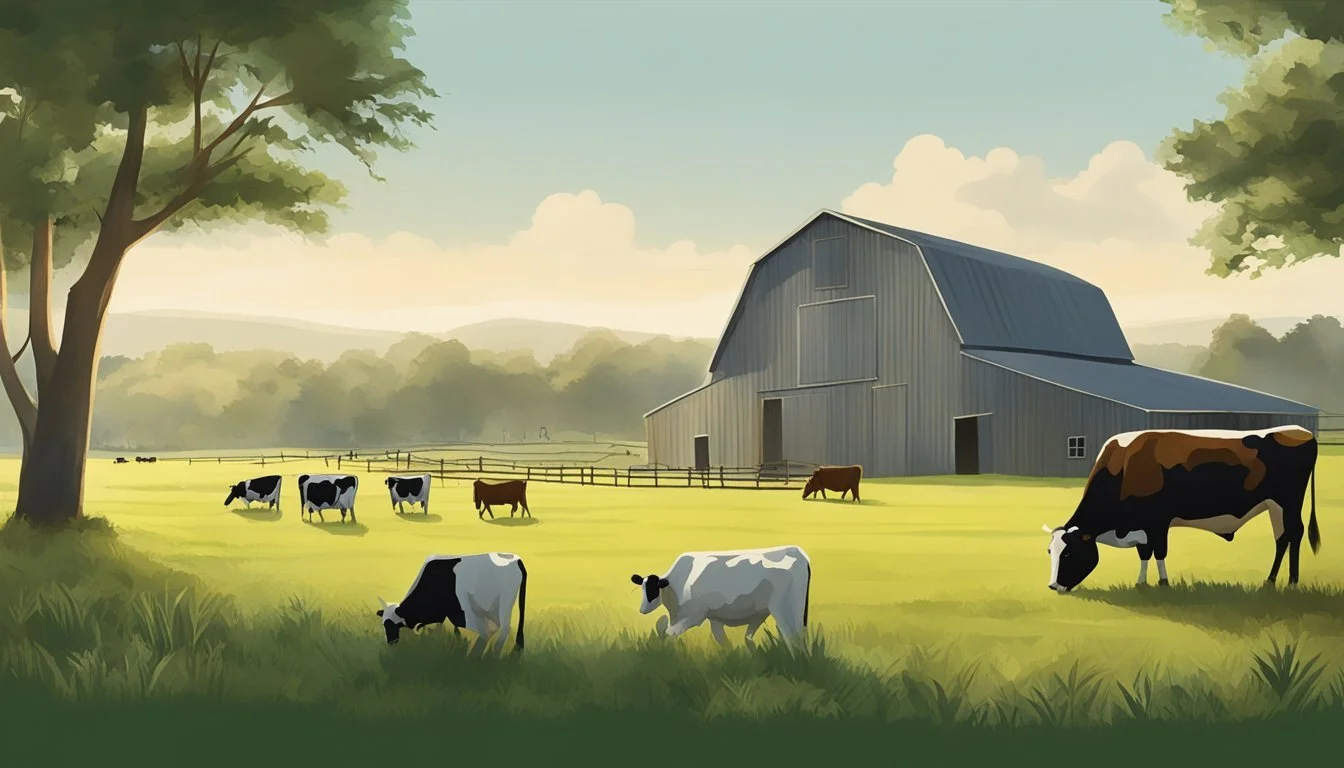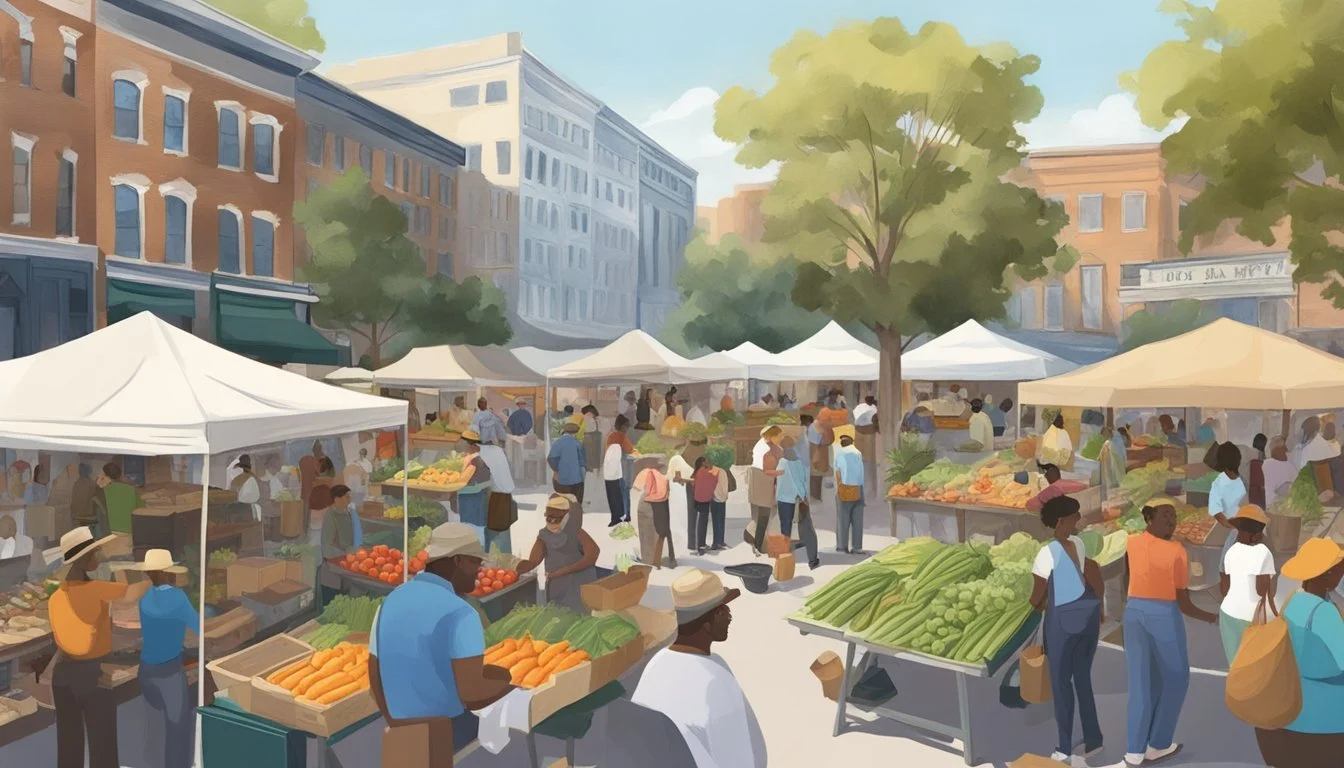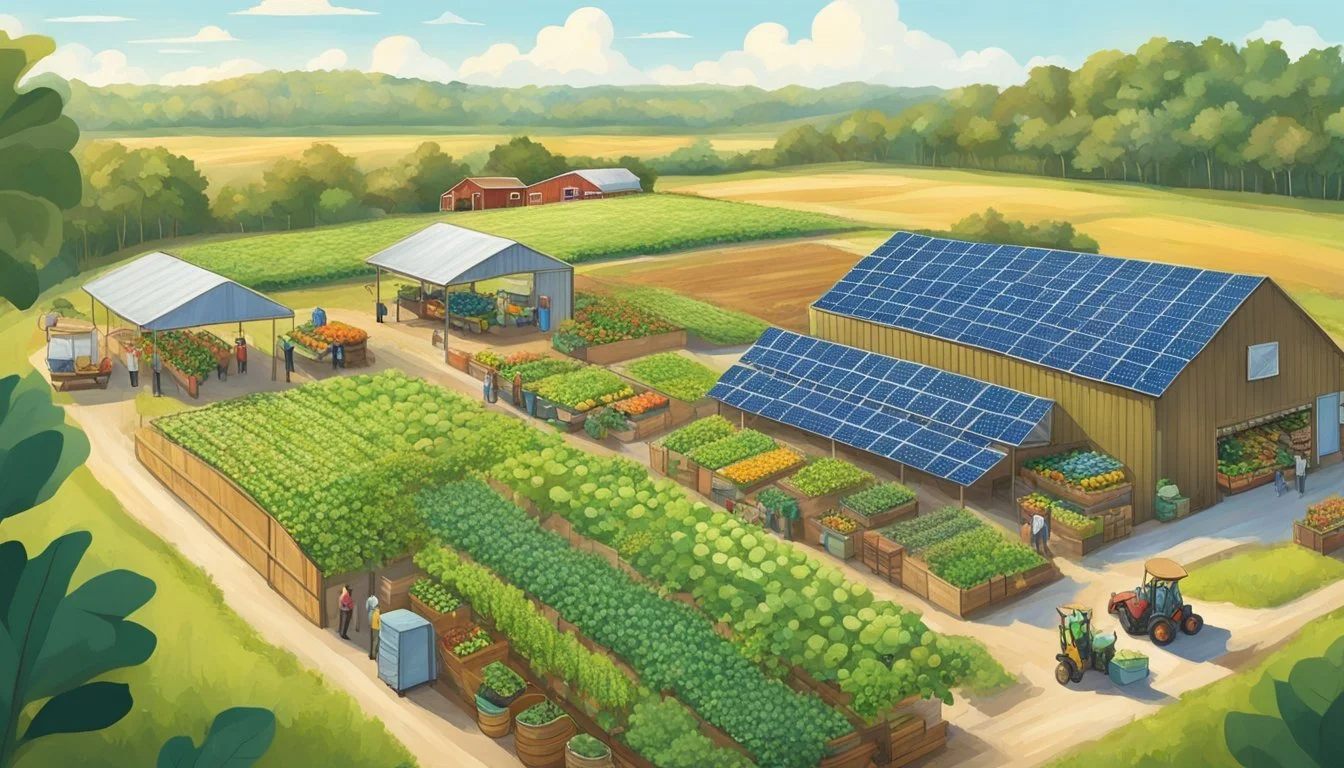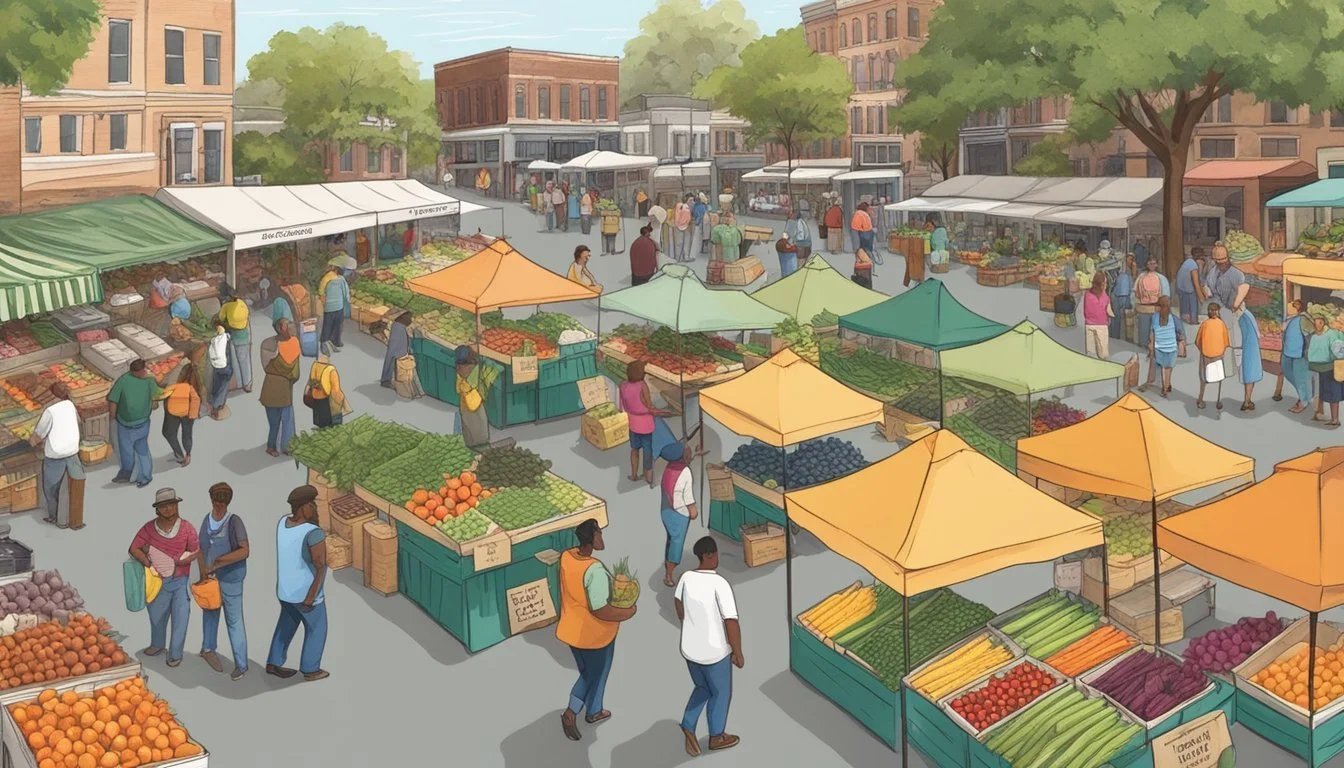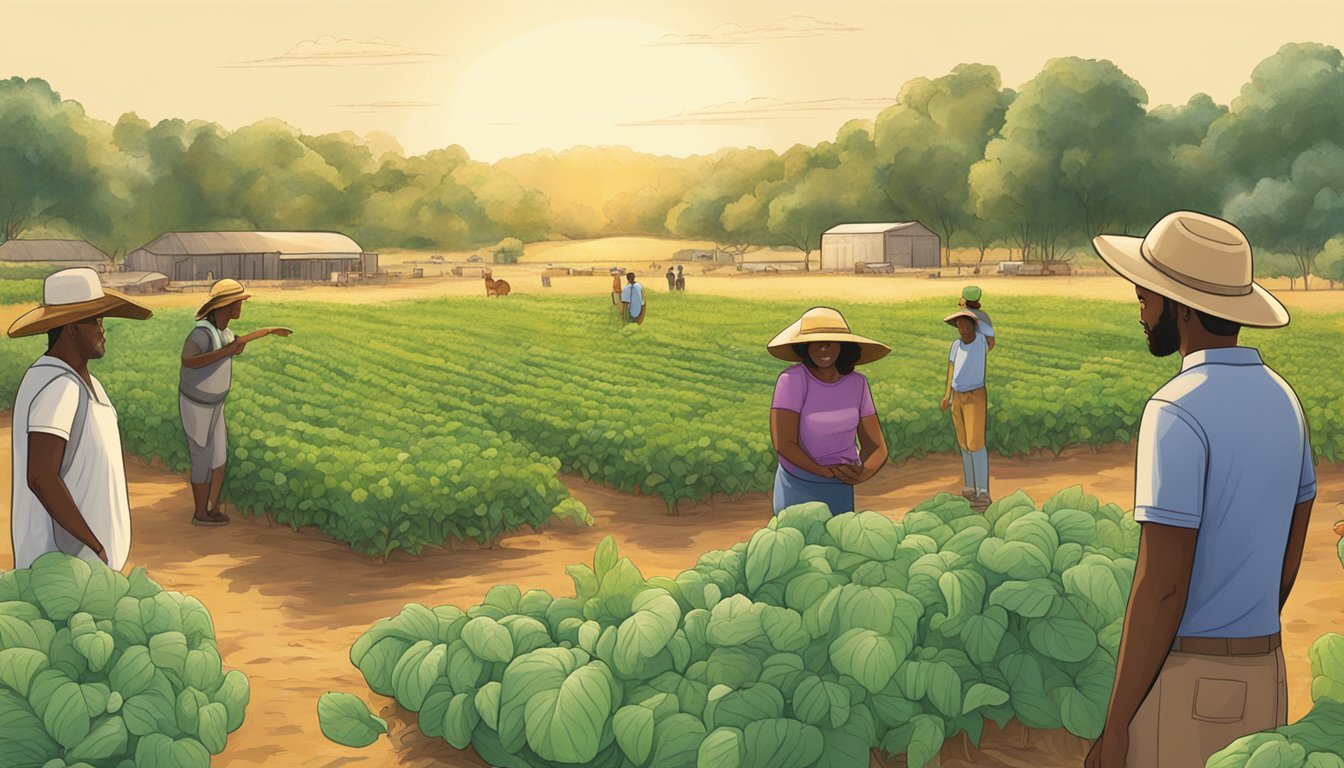Community Supported Agriculture (CSA) in Savannah, GA
A Guide to Local Farm Shares
Community Supported Agriculture (CSA) represents a growing movement in local food sourcing and sustainability, offering a direct connection between consumers and their food source. In Savannah, Georgia, this practice empowers local farmers and consumers alike, providing a system where individuals can purchase "shares" of a farm's harvest. Members of a CSA often receive a weekly or bi-weekly delivery of fresh produce, fostering a relationship built on support and trust between local farmers and community members.
The landscape around Savannah, with its favorable climate and fertile soil, is conducive to a robust array of produce. With an increasing number of farms around the Savannah area adopting the CSA model, residents have ample opportunities to access fresh, healthy local produce. These CSA programs, like those operated by farms in nearby counties, help in preserving the regional agricultural heritage and ensuring the sustainability of local farms.
As CSAs gain popularity, they also contribute to the local economy and encourage environmentally responsible farming practices. Consumers benefit from the nutrient-rich, fresh food, while farmers receive a stable income and a dedicated market for their products. This symbiotic relationship underscores the core values of community and mutual reliance that CSA models are built upon.
Understanding CSA
Community Supported Agriculture embodies a partnership between local farms and the surrounding community, providing a direct link between the production and consumption of food.
Concept and History
Community Supported Agriculture (CSA) emerged as a concept in the early 1960s in Germany, Switzerland, and Japan as a response to food safety concerns and the urbanization of agricultural land. It gained traction in the United States in the 1980s. CSA works on the premise that individuals, known as members or subscribers, support a local farm by paying for a portion of its harvest in advance. This financial commitment provides the farm with upfront capital for the season’s operational costs.
Benefits for Consumers and Farmers
For consumers, CSA programs offer fresh, seasonal produce, often at a lower price than what might be available at grocery stores or markets. The direct-to-consumer model fosters an understanding of where and how food is grown, which can enhance appreciation for sustainable farming practices. Conversely, farmers benefit from a reliable income source, reduced marketing costs, and the ability to plan their crop production more effectively with a guaranteed market.
For Consumers:
Access to fresh, local produce
Lower overall food costs
Connection to the source of their food
For Farmers:
Reliable, early-season income
Lower marketing and distribution costs
Support from local community
Types of CSA Programs
There are various types of CSA programs tailored to suit diverse community needs. Traditional CSAs consist of weekly deliveries or pickups of vegetables, and may also include fruit, herbs, flowers, dairy, and meat. Some CSAs also offer the flexibility of customized shares where members select their produce, while others integrate a social justice element by providing subsidized shares for low-income households.
Traditional CSA: Shares of seasonal produce, usually with weekly deliveries or pickups.
Customizable CSA: Members choose their produce based on personal preference and availability.
Subsidized CSA: Programs designed to make CSA shares affordable for every income level.
The structure of a CSA program can vary significantly from one farm to another, with some providing additional benefits such as farm visits, workshops, or community events.
Local CSA Farms in Savannah
The Savannah region benefits from a variety of CSA programs, where local farms offer shares of their produce to the community, fostering a connection between growers and consumers and supporting the local economy.
List of CSAs in and Near Savannah
Rest Park Farm in Beaufort, SC, operates a farm stand and attends local farmers markets.
Savannah Family Farm Share is a community initiative aimed at reducing food insecurity for young children and creating market opportunities for small farmers.
Unique Offerings of Savannah CSAs
CSAs in Savannah often promise subscribers fresh, seasonal produce reflecting the region's agricultural diversity. For instance, participants may find themselves with an array of organic vegetables, fruits, and even local artisan products like honey or jams.
Economic Impact on Savannah's Local Economy
CSA programs in Savannah play a significant role in supporting local farmers and the broader economy. By directly purchasing from these CSAs, consumers help sustain agricultural jobs and ensure the viability of farming in the region, keeping money circulating within the local community.
Seasonal Produce and Products
In Savannah, Community Supported Agriculture (CSA) programs offer a wide range of seasonal produce and specialty products, reflecting Georgia's rich agricultural heritage. These CSA programs provide community members with fresh, locally grown fruits and vegetables, as well as unique items during special times of the year.
Typical Offerings from Savannah CSAs
Savannah CSAs provide a diversity of fresh produce suitable for the climate and soil of the region. Participants can expect to receive:
Spring and summer bring an abundance of fruits like peaches, blueberries, and blackberries.
Vegetables such as tomatoes, cucumbers, and peppers are staple vegetables during the warmer months.
The Vidalia sweet onion, a Georgia specialty, is a highlight of Savannah's CSA boxes in the spring.
Rare Finds in Savannah's CSA Programs
CSA members might be pleasantly surprised by occasional rare finds in their subscriptions:
Season-specific items such as heirloom apple varieties not commonly found in supermarkets.
Exclusive batches of specialty greens like purple mustard or micro basil, grown by local farmers.
Thanksgiving Specials
Around Thanksgiving, Savannah's CSA programs incorporate festive and traditional produce, ensuring celebratory tables are garnished with the finest local offerings:
Heritage breed turkeys and broad-breasted turkeys raised in the region become available for pre-order as a centerpiece for the holiday meal.
Seasonal staples such as pumpkins, sweet potatoes, and a variety of squashes are plentiful.
Fresh watermelons might still be available in early November, weather allowing, providing a sweet end to the fall season.
Animal Husbandry and Dairy
This section explores the rich variety of animal husbandry practices and dairy production that support Savannah's Community Supported Agriculture (CSA) initiative, focusing on meat, poultry, and dairy offerings that emphasize local and sustainable practices.
Meat and Poultry Options
Community Supported Agriculture (CSA) programs in the Savannah area provide a platform for local farmers to offer a selection of animal products. Customers can access grassfed beef, known for its lower fat content and potential health benefits, from pastures where cattle consume their natural diet. Similarly, pastured pork is provided by pigs raised on open land, allowing them to forage and roam freely, which tends to improve the quality of the pork.
Free-range chickens contribute significantly to the CSA meat offerings, with their meat being a staple for many families due to its versatility and flavor. Notably, the byproduct of raising free-range chickens is the availability of free-range eggs, which are sourced from chickens that have been given the freedom to roam, potentially leading to eggs with richer, more robust flavors.
Dairy Products from Local Farms
The dairy section of Savannah's CSA includes a range of products like milk, cheese, and items from goat dairy. Milk primarily comes from cows raised on local farms with careful attention to animal welfare and natural feeding practices. This emphasis on quality and local production extends to cheese, which is crafted in small batches to ensure distinctive taste and texture.
Local CSAs also feature registered Nigerian dwarf dairy goats. These small goats are an excellent source of goat dairy products such as cheese and milk. Nigerian dwarf goats are valued for their high-quality milk, rich in butterfat and ideal for artisanal cheese-making. Customers of the CSA appreciate the sustainability aspect and the unique flavor profile that goat dairy products bring to the table.
Special Programs and Events
In Savannah, GA, Community Supported Agriculture (CSA) programs extend beyond the provision of fresh, locally grown produce. They actively engage the community through special programs and events that allow for hands-on experiences and education.
Community Garden and U-Pick
Within Savannah's CSA scene, community gardens serve as a hub for local agriculture and offer U-Pick events. These gardens allow individuals to participate directly in the harvesting of various crops. LocalHarvest is a notable entity that helps residents find such community gardens and U-Pick farms, ensuring access to the freshest seasonal produce. For example, some of these locations provide opportunities to pick one’s own fruits and vegetables and even interact with animals like Nigerian Dwarf dairy goats, a breed popular for its high-quality milk.
Educational Workshops and Farm Tours
Many CSAs in Savannah also host educational workshops aimed at teaching sustainable farming practices and the importance of supporting local agriculture. These workshops cover a gamut of topics, from organic farming to cheese-making with milk from local Nigerian Dwarf dairy goats.
Farm tours are another key aspect, providing a behind-the-scenes look at the daily operations of a CSA farm. Visitors can gain insight into the farming process, from planting to harvesting, and learn how CSAs contribute to food security and community well-being.
Sustainable Practices and Certifications
In Savannah, GA, farmers and consumers are increasingly turning to sustainable agricultural practices and seeking certifications that mark their dedication to eco-friendly and reparative farming methods. Two key elements in this drive towards sustainability are adherence to certified organic farming practices and a commitment to all natural growing techniques.
Organic Certification and Regenerative Farming
Organic Certification is a process regulated by the USDA that requires farmers to demonstrate their adherence to a set of national standards for organically produced items. In Savannah, these standards often correlate with regenerative farming practices, which prioritize soil health, biodiversity, and ecosystem balance.
Criteria for Organic Certification:
Prohibition of synthetic fertilizers and pesticides
Use of crop rotations, cover crops, and on-farm composting
Maintenance of a transparent record-keeping system
Regenerative Farming, on the other hand, extends beyond organic standards. It involves practices aimed at rebuilding organic soil matter and restoring degraded soil biodiversity.
Core Principles of Regenerative Farming:
Enhancing soil fertility naturally
Improving water retention and sequestering carbon
Increasing farm resilience
All Natural Growing Practices
Farmers in Savannah often advocate for all natural growing practices. These techniques forego synthetic inputs entirely and rely on ecological processes to manage farm operations effectively.
Characteristics of All Natural Growing Practices:
Exclusive use of natural fertilizers, such as compost and green manure
Pest management relying on natural predators and intercropping
These sustainable practices not only result in healthier, organic produce but also contribute to a more vibrant and resilient local food system. By employing both certified organic methods and all natural techniques, Savannah's farming community demonstrates its commitment to responsible stewardship of the land.
Joining a CSA
Community Supported Agriculture in Savannah, GA, offers a direct avenue for consumers to purchase fresh produce from local farmers. When considering a CSA program, one should be mindful of selecting a suitable program, understanding the membership fees involved, and setting realistic expectations for the subscription content.
How to Choose the Right CSA
In selecting a CSA, individuals should consider the location and types of produce offered. It's advisable to seek out CSAs like Ludowici Garden that align with the consumer’s preference for organic or conventional farming practices. Potential members may want to contact the farms directly to ask about their growing practices and the variety of produce available. For example, some CSAs may offer a half share, ideal for smaller households or those new to CSA subscriptions.
Understanding Membership Fees
The membership fee is typically a pre-paid cost that covers a season’s worth of produce. This fee can vary depending on the CSA's scale and the type of share. Some CSAs may offer tiered pricing options:
Full Share: Suitable for larger households, often enough vegetables for 3-5 people.
Half Share: A smaller option, ideal for 1-2 people or as a trial to the CSA experience.
It is recommended that prospective members inquire about payment schedules and methods, as some CSAs provide flexible options.
What to Expect in a Subscription
Members can expect a regular delivery or pickup of a box containing a variety of seasonal produce throughout the agreed subscription period. The contents can fluctuate weekly based on harvest availability. Members should anticipate a diverse range of vegetables and sometimes additional farm products like eggs or honey. Being a part of a CSA such as Rest Park Farm in Beaufort County, members support local agriculture and receive fresh produce regularly, fostering a connection with the food they eat and the land it comes from.
CSA Management and Operations
Community Supported Agriculture in Savannah, GA, operates on a framework that emphasizes the importance of effective management, the utilization of technology for data handling, and efficient logistics for packaging and distribution. Each component is critical in ensuring the success and sustainability of CSA initiatives in the region.
Roles and Responsibilities of a Market Manager
The market manager plays a pivotal role in the CSA's functionality. They are tasked with overseeing the day-to-day operations and ensuring adherence to standards. This individual is responsible for coordinating with local farmers, managing CSA memberships, and facilitating communication between producers and consumers. A market manager ensures that the distribution of products is done fairly and efficiently, maintaining financial records and ensuring that all activities comply with local regulations.
Technology and Data Management
Technology integration is key to the efficient operation of a CSA. Management software, often referred to as CSAware, can support a wide array of functions including member subscriptions, weekly box planning, and online EBT acceptance. Furthermore, a CSA relies on data management systems - often powered by Application Programming Interfaces (APIs) - to track production, distribution, and sales. These systems allow for the aggregation and analysis of data to improve decision-making and customer satisfaction.
Packaging, Pickup, and Delivery Logistics
Packaging for CSA products focuses on maintaining product freshness while being sustainable. All packaging must adequately protect the contents during transport. Pickup locations are selected for convenience and accessibility for members. CSA programs in Savannah, GA, may offer delivery options, with market managers coordinating the logistics of getting shares from the farm to the consumer's doorstep or designated pickup points. This process is streamlined by planning delivery routes efficiently to reduce carbon footprint and costs.
Incorporating these practices, community-supported agriculture in Savannah can thrive, fostering a resilient local food system centered on collaboration and mutual support.
Community Engagement and Support
In Savannah, GA, the engagement with and support for Community Supported Agriculture (CSA) models reflects a strong bond between local farms and community members. This section delves into the specifics of how this connection is fostered and the role it plays in supporting local agriculture and food systems.
Building a Community around Local Agriculture
Local agriculture in Savannah benefits from the establishment of community gardens and farms that encourage participation and education. Gratitude Gardens, for example, serves as a nexus for community members to not only purchase fresh, naturally grown produce but also engage in the cultivation process. This hands-on approach solidifies a relationship where both the community and the CSA thrive through mutual effort. Community gatherings and educational workshops further strengthen this bond, creating a well-informed community that values sustainability and local farming practices.
Contribution to Local Food Directories
Community-supported agriculture in Savannah contributes significantly to local food directories, which are essential tools for consumers interested in sourcing seasonal produce directly from farms. These directories serve as a bridge between consumers and CSA programs, ensuring that the public has access to up-to-date information on available shares. It is common for CSA shares in the area to include diverse selections of vegetables, fruits, herbs, and occasionally additional farm products like eggs or honey. By facilitating easier access to local farm products, CSAs and local food directories collectively support the local economy and provide a platform for agricultural education and food sovereignty.
Storage and Preparation Tips
Joining a Community Supported Agriculture (CSA) program in Savannah, GA provides members with a bountiful supply of fresh and seasonal produce. To maximize the longevity and flavor of these items, it is essential to master storage, canning, freezing, and cooking techniques.
Extending Freshness: Canning and Freezing Techniques
Canning is an ideal method for preserving the taste of the harvest. To ensure safety, one should always follow recommended canning guidelines, which involve using a water bath for high-acid foods like tomatoes and fruits, and a pressure canner for low-acid foods such as vegetables and meats.
Fruits: Can be canned in syrups or as jellies and jams.
Vegetables: Pickling is a popular canning method, great for cucumbers, beets, and peppers.
Freezing is another effective way to extend the freshness of CSA produce. Vegetables should be blanched before freezing to maintain quality. Blanching involves boiling for a short time and then plunging the produce into ice water.
For freezing procedures, follow these steps:
Clean: Rinse produce thoroughly.
Blanch: Briefly boil, then cool in ice water.
Dry: Pat produce dry to avoid freezer burn.
Pack: Use airtight containers or freezer bags.
Cooking with Seasonal Produce
Eating seasonally encourages a varied diet and the opportunity to experience the full flavor of produce at its peak. To take advantage of the CSA offerings, one should:
Research: Look for recipes that highlight the specific produce in season.
Prepare: Gather all necessary equipment and ingredients before cooking.
Quick tips for cooking fresh produce include:
Sautéing greens like spinach or kale with garlic and a dash of olive oil.
Roasting root vegetables with herbs to deepen their natural flavors.
By utilizing canning and freezing techniques, CSA members can enjoy Savannah's local harvest year-round, and by embracing seasonal cooking practices, they can enhance their culinary repertoire while supporting local agriculture.
Future of CSA in Savannah
Community Supported Agriculture (CSA) in Savannah, Georgia, stands at the cusp of significant evolution, exploring diversity in produce and innovations that promise to reshape its agricultural landscape.
Trends and Growth Potential
CSA models in Savannah are witnessing a shift towards embracing a broader range of locally grown produce. This move not only caters to the community’s burgeoning interest in diverse food options but also enhances the stability and resilience of local farms. The incorporation of various crops can mitigate risks associated with crop failure, appealing to a larger consumer base that seeks both traditional and unconventional produce.
The potential for growth is palpable, given Savannah's inherent interest in sustainable living and community health. Local farms can capitalize on the strong, community-driven market, where consumers are increasingly motivated to support local agriculture. The demand for CSA shares is on an upward trend, signaling a promising future for the investment in and consumption of locally sourced foods.
Innovations in CSA Models
Innovation remains a cornerstone for the sustained success of Savannah's CSA initiatives. Technological advancements and creative CSA models are emerging, providing convenience and flexibility for both farmers and consumers. Online platforms for CSA management and product distribution are gaining traction, simplifying the process of subscribing to CSA shares and selecting products.
Local farms are testing novel approaches such as customizable share boxes, allowing consumers to choose their preferred items rather than receiving a standard set of produce. This customizability enhances consumer satisfaction and reduces food waste. Additionally, some CSA programs are incorporating value-added products like cheeses, pickles, and baked goods, sourced from their produce or in collaboration with other local artisans. This diversification not only strengthens the economic viability of CSA but also enriches the consumer's experience and connection with local food systems.




